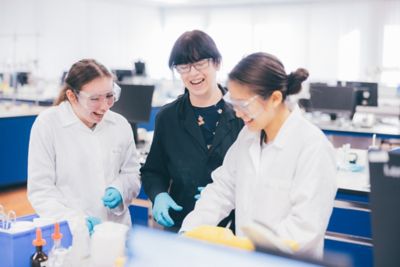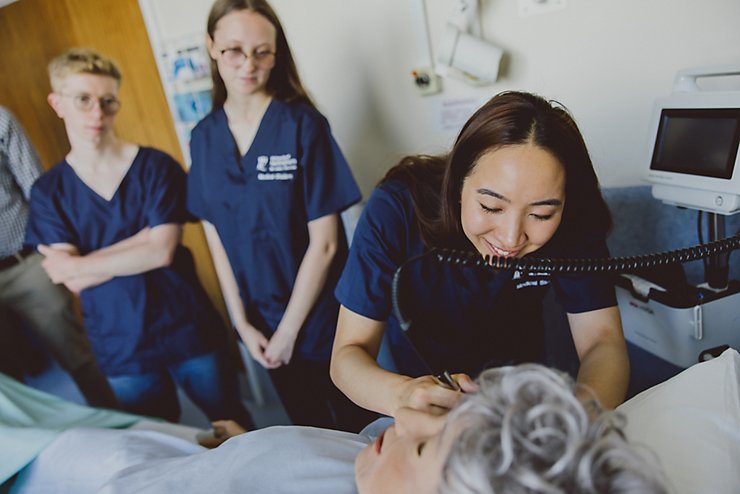| 7.0 (with no less than 7.0 in reading, speaking and listening and no less than 6.5 in writing). GCSE English language at level 6 (B) or above may also be accepted. |
English language requirements
As well as IELTS (listed above), we also accept other English language qualifications. This includes TOEFL iBT, Pearson PTE, GCSE, IB and O level English. Check our English language policies and equivalencies for further details.
For presessional English or one-year foundation courses, you must take IELTS for UKVI to meet visa regulations.
If you need support to meet the required level, you may be able to attend a Presessional English for Academic Purposes (PEAP) course. Our Centre for English Language Education is accredited by the British Council for the teaching of English in the UK.
If you successfully complete your presessional course to the required level, you can then progress to your degree course. This means that you won't need to retake IELTS or equivalent.
7.0 (with no less than 7.0 in reading, speaking and listening and no less than 6.5 in writing). GCSE English language at level 6 (B) or above may also be accepted.
Alternative qualifications
We recognise that applicants have a wealth of different experiences and follow a variety of pathways into higher education.
Consequently we treat all applicants with alternative qualifications (besides A-levels and the International Baccalaureate) on an individual basis, and we gladly accept students with a whole range of less conventional qualifications including:
- RQF Level 3 BTEC National Extended Diploma (in Health and Social Care, Applied Science or Sports and Exercise Science) at DDD.
- RQF Level 3 BTEC National Diploma (in Applied Science or Sports and Exercise Science) at DD plus 1 A level grade B.
- RQF Level 3 BTEC National Diploma at DD plus 1 A level in Biology or Chemistry at grade B.
- RQF Level 3 BTEC National Extended Certificate (in Applied Human Biology, Applied Science or Sports and Exercise Science) at D plus 2 A Levels at grades BB.
- RQF Level 3 BTEC National Extended Certificate at D plus 2 A Levels including Biology or Chemistry at grades BB.
- Access to HE Diploma with 24 Level 3 graded credits at Distinction and 21 at Merit or above. This must include 24 graded credits in Biology/Human Biology with 21 credits at Distinction and 3 at Merit or above. Within the 45 graded credits lab reports and independent research projects are not counted towards graded Biology credits.
This list is not exhaustive. The entry requirements for alternative qualifications can be quite specific; for example you may need to take certain modules and achieve a specified grade in those modules. Please contact us to discuss the transferability of your qualification. Please see the alternative qualifications page for more information.
Please note: Applicants whose backgrounds or personal circumstances have impacted their academic performance may receive a reduced offer. Please see our contextual admissions policy for more information.
Does not acccept year 2 applications.
Visa restrictions
International students must have valid UK immigration permissions for any courses or study period where teaching takes place in the UK. Student route visas can be issued for eligible students studying full-time courses. The University of Nottingham does not sponsor a student visa for students studying part-time courses. The Standard Visitor visa route is not appropriate in all cases. Please contact the university’s Visa and Immigration team if you need advice about your visa options.
English language requirements
Midwifery students need to be fluent in the English language in order to both understand and complete the course and to communicate effectively with women and members of the multidisciplinary team.
For students whose first language is not English we require an IELTS score of 7.0, with no less than 7.0 in reading, speaking and listening and no less than 6.5 in writing.
Please note that a pass at GCSE English language with a Grade 6 or above will normally be regarded as meeting this requirement.
Notes for applicants
For all courses, selection is made based on meeting entry requirements, academic potential, and evidence of a commitment to midwifery.
All offers are subject to being successful at interview, satisfactory occupational health screening, and Disclosure and Barring Service (DBS) clearance.
Interview
An interview is mandatory, in line with our professional and regulatory body requirements.
All offers are also subject to a successful interview and satisfactory health screening, and disclosure and barring service (DBS) clearance. Visit our application process page to find out more about personal statements, work experience and interview- how to prepare and what to expect.
Work experience
You should consider work experience or extracurricular activities to boost your application. This can include experience in the caring environment or other environments, such as working in a cafe. You need to identify any skills that you have gained from this experience and reflect these in your personal statement and interview.
Health and Criminal Records screening
In accordance with Professional and Regulatory Body requirements, all applicants are subject to health screening by Occupational Health, and Disclosure and Barring Service (DBS) checks before they can commence the course.
More information can be found on the School of Health Sciences Occupation Health and DBS page.
Minimum age requirement
We do not consider your application if you will be under 17 years and 10 months on the 1 September of the year you start your course.
Elite athletes
We can make a contextual offer if you're an athlete competing at a high level and are offered a Sports Scholarship. We recommend that you complete the expression of interest form as soon as possible so that your elite athlete status can be confirmed prior to an offer being made. More information and how to apply can be found on the UoN Sport pages.
Part-time working alongside University studies
As a student on a full-time professional training course, it is expected that your primary focus would be your full-time university studies. If you're considering part-time paid employment alongside your university studies it is advised that you discuss your position with your personal tutor before committing.
Previous applicants
You are welcome to submit an application, even if you have previously applied to study midwifery at the University of Nottingham. Applicants who have been unsuccessful in a midwifery interview with us previously should contact us before submitting a second application for further advice.
Mature Students
At the University of Nottingham, we have a valuable community of mature students and we appreciate their
contribution to the wider student population. You can find lots of useful information on the mature students webpage.





